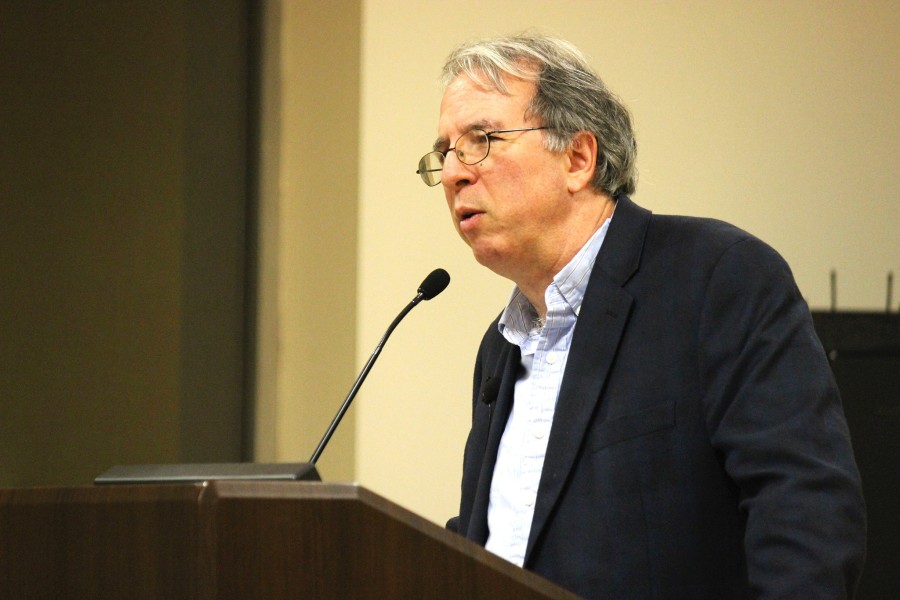Dorothy Day’s influence reaches Marywood
Photo credit/ Kyle Clouse
October 18, 2015
Robert Ellsberg, the former editor of The Catholic Worker, spoke to members of the campus community about the life of Dorothy Day on Tuesday, Sept. 29.
Day, an activist and devoted Catholic, founded The Catholic Worker with Peter Maurin in 1933.
At the event, Ellsberg discussed the controversy surrounding Day and her prime mission of ending injustice.
“I’m very glad to be here in the Electric City and at Marywood during the 100 year anniversary,” said Ellsberg. “I cannot think of a more exciting time to be talking about Dorothy Day following the visit of Pope Francis. I wish he could know a little bit about this woman who so embodied the vision of the church and her core commitment to the poor.”
Born on Nov. 8, 1897, Dorothy Day was a radical for her time. A seemingly unlikely candidate for sainthood, Day was a pacifist who renounced Christianity in her youth, had an abortion, picketed for women’s suffrage in Washington, D.C. and was arrested multiple times.
Ellsberg offered quotes from Day that she had said during her lifetime which included her feelings about her daughter and renewed belief in God.
“All my life, I have been haunted by God,” said Day at one point in her life. Following the birth of her daughter, Day felt God in her life and had her daughter baptized in the Catholic Church.
“No human creature could conceive or contain such happiness and gratitude as I have seen following the birth of my daughter,” said Day, according to Ellsberg.
Day recognized the need for a new kind of saint. She had wondered, “Why was there so much done in remedy of evil instead of stopping it?” Her vocation took form around this challenge, and the underlying mission of her life was to join charity for struggle of justice.
Meeting French immigrant Peter Maurin was the answer to her prayer.
Together in 1933, the two started the Catholic Worker, a publication that offered a Catholic perspective on social issues. The publication presented the challenge of what the world would look like if people truly recognized Christ in their neighbors.
“She believed that Christ was present in the poor,” said Ellsberg. “How can we love God, who we did not see, if we do not love our neighbors who we do see?”
Day was an advocate for peace. She was even considered a communist by some who believed she was working to bring down the Church from within. Ellsberg said that Day acknowledged this animosity toward her and that she had quipped, “Neither revolutions nor faith were to be won without keen suffering.”
Toward the end of her life, Day knew her “duty of delight” was almost done, but was still adamant about doing the work she loved. “With all these symptoms of decrepitude, my heart can still leap with joy,” said Day, according to Ellsberg. Day still wrote articles for the Catholic Worker and even wrote in her journal days before her death.
“Her death was nearly 30 years ago, but for me, seems like no time at all,” said Ellsberg. “Dorothy was especially sensitive to struggling youth and until the end, she was surrounded by young people drawn to her story and inspired to take up her mission.”
Senior social work major Shannon Evarts enjoyed the lecture.
“Social workers are flawed people, but we want to help others. She’s a very real person who can do big things,” said Evarts. “You have to put yourself on a vulnerable level to help people. You have to live amongst the people you are willing to help.”
Sr. John Michele, IHM, introduced the lecturer. Following her introduction, Fr. John Siliban, the director of international learning programs and study abroad at the University of Scranton, offered a few words about the speaker.
“Robert Ellsberg has collected and edited many of Day’s works,” said Siliban. “He has spoken widely of her life and legacy. I have been inspired by Robert… he is a profoundly reflected man, and authentically committed to the message of the Gospel.”
Contact the writer: [email protected]
Twitter: @ADuncklee_TWW





